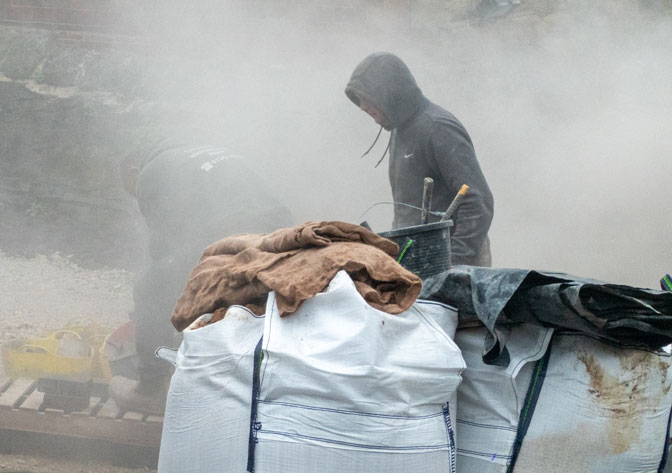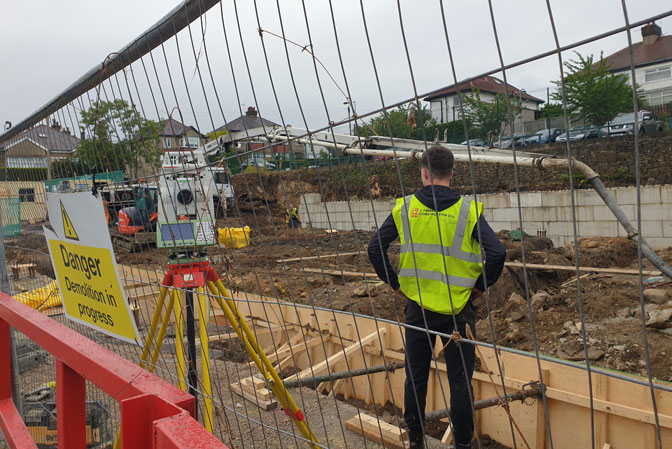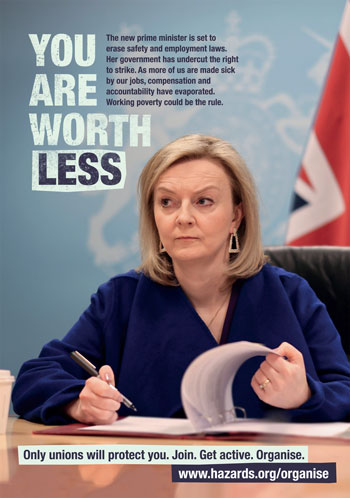
It’s bad, but you should just shut up and take it. Enforcement of workplace safety laws has fallen off a cliff. Sickness caused by work has never been higher. And compensation, only ever consolation after an injury, illness or death caused by work, is becoming increasingly rare.
Unions have always been a protective buffer. Studies show repeatedly that workplaces with union representation have what has been described as a ‘union advantage’, ‘union dividend’ or ‘union effect’.
It has never been more essential. Britain’s employment laws certainly don’t offer sufficient protection in the new world of work, confirmed in the 2017, Conservative government-commissioned, ‘Good work’ Taylor review of modern working practices which led to an extensive government consultation.
In response, the government first announced it would bring forward a new employment bill in December 2019 to “protect and enhance workers’ rights as the UK leaves the EU, making Britain the best place in the world to work.”
Conservative ministers have repeated the ‘manifesto commitment’ at least 20 times since. But that commitment is incompatible with current Conservative priorities, fashioned not by reasoned deliberation but on the hoof, on the stump, in an August 2022 leadership contest where Conservative candidates competed to out-right each other.
Not what we want
TUC polling by GQR has shown huge public support for boosting workers’ rights. Eight in 10 (79 per cent) support protecting and enhancing all workers’ rights which have been retained since we left the EU such as holiday pay, safe limits on working time and rest breaks – rising to 81 per cent for Conservative voters.
 Three in four (74 per cent) support ending ‘fire and rehire’ – the practice where employers threaten to sack workers unless they accept new contracts with worse terms and conditions – rising to 77 per cent among Conservative voters. Three in four (76 per cent) support boosting workers’ rights in the gig economy – rising to 78 per cent of Conservative voters.
Three in four (74 per cent) support ending ‘fire and rehire’ – the practice where employers threaten to sack workers unless they accept new contracts with worse terms and conditions – rising to 77 per cent among Conservative voters. Three in four (76 per cent) support boosting workers’ rights in the gig economy – rising to 78 per cent of Conservative voters.
The message came in a 29 August 2022 letter to the Tory leadership run-off candidates, Liz Truss and former chancellor Rishi Sunak. The letter from 40 organisations, which included the National Consumer Federation, the British Safety Council, RSPB and the Wildlife Trusts, asked them to keep vital regulations that they say are necessary safeguards for the public.
“This is real stuff affecting people’s everyday lives,” said Emma Rose, director of Unchecked, a coalition of organisations making the case for strong public protection. “Strong protections and rules are part of Britain’s success story. They are the invisible framework that keep our society running.
“They uphold high standards across public life, protect the vulnerable, underpin trust between businesses and consumers, and create a level playing field for businesses.”
Turning right on rights
The government, though, is not in the listening mood. Memories of the Taylor Review and the repeat Conservative promises to beef up employment rights are, it appears, history.
The TUC said workers face a “double whammy” as the Conservative government is threatening to rip up their legal rights while attacking their ability to defend their working conditions and living standards through collective action.
The government is already facing a union judicial review and a legal challenge at the International Labour Organisation (ILO) , after it undermined the right to strike by allowing agency – scab – labour in disputes, despite objections from both unions and the agency staff trade body the REC.
 BREAKING POINT New prime minister Liz Truss has accused British workers of a “lack of graft”. But workers in Britain work the longest hours in Europe and put in millions of hours in unpaid overtime, with many missing breaks and on the verge of burnout.
BREAKING POINT New prime minister Liz Truss has accused British workers of a “lack of graft”. But workers in Britain work the longest hours in Europe and put in millions of hours in unpaid overtime, with many missing breaks and on the verge of burnout.
The emergence on 5 September 2022 of Liz Truss as new Tory leader and as a consequence the accidental prime minister, saw a ‘bonfire of rights’ entrenched as the new gameplan. It was predictable. Liz Truss was one of the original architects and advocates of the language as an author of the 2012 right-wing play book Britannia Unchained. The shift puts EU-derived employment rights in the firing line.
The threats to workers’ rights and limits on workers’ ability to bargain for better pay and conditions show that the Conservative government is “cooking up a recipe for low-paid, burnt-out Britain,” the TUC said. It added that Britain is a “nation of grafters” – in a swipe at Truss, who previously accused British workers of a “lack of graft”.
Workers in Britain work the longest hours in Europe, with 3.8 million workers doing unpaid overtime in 2021.
Impotent by design
All recent UK safety law came from Europe, including the management, asbestos, manual handling, personal protective equipment, chemical, biological, physical and display screen hazards and other rules. They constitute all the UK’s new safety laws for an entire working generation, and their removal would leave a gaping hole in workplace protections.
On 22 September 2022, Liz Truss’ government published the Retained EU Law (Revocation and Reform) Bill in the House of Commons, the latest step in the Conservative push to remove EU-derived employment and safety rights. A total of 55 health and safety measures are on the government’s scrutiny list, including the working time regulations, chemical safety rules, the construction design and management regulations, and the ‘big six’ workplace safety laws introduced in response to EU directives.
Conservative deregulation policy and Brexit fall-out has already started the UK’s descent to a state of regulatory impotence on health and safety.
Its union-employer-government – tripartite – WATCH and ACTS committees used to develop workplace chemical safely limits, but like most other Health and Safety Executive (HSE) advisory committees both were axed. This left only the EU occupational health limits standard-setting process, which unions say was thorough and involved extensive consultation with employers and unions, but from which the UK is now excluded.
In July 2022, chemical charity Chem Trust warned a UK government confirmation it will not match new EU restrictions on a number of potentially hazardous chemicals will put people at risk.
Chem Trust said there was the prospect of a “chasm” emerging between Brussels and the UK, leaving Britain with weaker regulations on chemicals that are potentially harmful to human health and the environment. Research by Chem Trust found that since Brexit the UK has matched only two out of five EU restrictions on chemicals that could be hazardous, with a further 20 EU restrictions in the pipeline set to increase the regulatory gulf.
When it left the EU, the UK chose to leave the European Reach chemicals management system, replacing it with a UK Reach regime overseen by the Health and Safety Executive (HSE). Only there is no such regime.
A May 2022 report by the National Audit Office, the parliamentary spending watchdog, warned it could take “a further four years” for the HSE to recruit enough staff to ensure it can fully deliver its post-Brexit regulatory functions.
But even with the staff, it has dismantled the representative structures that allowed any scrutiny of the processes.
TUC thrown off
A new – and potentially illegal move – by the Conservative government has dealt an even more serious blow to the UK’s long-standing consensus approach to workplace safety.

GOING BACKWARDS The Conservative government broke with convention and appointed a former Tory minister as chair of the Health and Safety Executive (HSE) board. Now that former minister and a current DWP secretary of state have denied the TUC a place on the HSE board for the first time in its near 50-year history.
The Health and Safety at Work Act has, since it took effect in 1975, required the secretary of state to ensure employer, employee and local authority interests are represented on the HSE board, stating the employee representatives are appointed “after consulting such organisations representing employees as he considers appropriate.”
The TUC is that organisation, and has nominated a high ranking TUC official to what was effectively the TUC seat every time the vacancy arose.

When TUC head of organising Kevin Rowan finished his allotted terms on HSE’s board in 2021, the TUC nominated Paul Nowak (right), then the TUC deputy general secretary and now the incoming TUC general secretary, as his replacement. He would have been the most senior TUC official ever to fill the seat, signalling the issue was treated as a top priority at the highest levels in the trade union movement.
But then safety minister and now secretary of state at the Department of Work and Pensions (DWP), Chloe Smith, rejected Nowak’s application and insisted the post was readvertised. It meant there was no TUC presence on the HSE board for a year.
Nowak was again nominated by the TUC. However, on 2 September 2022 it was announced a person who had not held a position with the TUC since 2004, who had not been proposed in the required consultation with organisations representing employees, and who has no currently direct connection with unions had been appointed instead.
The UK Hazards Campaign said it was deeply concerned at this ‘political hijacking’ of HSE, leaving it without a TUC representative on its board in the regulator’s near 50-year history. It warned the move means HSE “no longer operates as a tripartite organisation or at best only pretends to operate as one.”
The campaign urged “the Secretary of State for Work and Pensions, to reverse this dangerous and politically motivated path and return the HSE to its independent tripartite origins.”
Sarah Newton, a former Conservative health and safety minister and the current Conservative government-appointed chair of the HSE, was on the four-person assessment panel for the position.
Cowboy capitalism
On 17 September 2022, the six-month anniversary of the P&O scandal, which saw 800 seafarers illegally sacked without notice and consultation, TUC general secretary Frances O’Grady said: “Everyone deserves respect and dignity at work. But there are too many bad bosses in this country who treat their staff appallingly – and get away with it because of our lax labour laws.” She added: “The P&O scandal showed us cowboy capitalism at its very worst.”
The TUC leader warned: “Now is the time for government action on workers’ rights. Rogue employers need to know they can’t get away with treating staff like disposable labour. Let’s be clear. Without stronger protections for workers, another P&O style scandal is on the cards.”
For some the consequences will be more dire still. Record numbers are already being harmed by their jobs. At the same time, there has been a catastrophic fall in HSE enforcement activity, now at a record low, with 2020/21 seeing 185 convictions, a quarter the level when the Conservatives came to power (Hazards 157).

SORRY SITE There has been a shocking and frightening decline in vital unannounced construction inspections being undertaken by the Health and Safety Executive (HSE), research by Unite has revealed. More.
Since 2010, the number of workers harmed by their jobs each year has increased by 30 per cent, but HSE convictions have fallen by 75 per cent, enforcement notices by 70 per cent. At the same time, compensation payouts for work-related harm have dropped by over 50 per cent (see: Worth less). The long-term decline in workplace fatal injury rates has stalled.
The latest Labour Force Survey findings revealed 1.7 million workers were suffering work-related ill-health in 2020/21, the highest figure on record. HSE figures released in July 2022, confirmed deaths linked to just one asbestos cancer, mesothelioma, are remaining around the high mark of over 2,500 cases each year, despite HSE predictions that a sharp decline would start years ago. The new figures show that 2,544 people died from the disease in 2020. This was 6 per cent higher than the 2,404 deaths in 2019.
Now the employment protections that allow workers to speak out about and challenge risks are under threat. Union influence over official safety decision-making is being eroded. Protective laws are up for the chop. A bad situation could quickly get worse.
It is not just our liberties at stake. It’s our lives.
‘Frightening’ drop in site safety inspections
There has been a shocking and frightening decline in vital unannounced construction inspections being undertaken by the Health and Safety Executive (HSE), research by Unite has revealed.
The union’s Freedom of Information (FOI) requests discovered that inspections have declined by 31 per cent in less than a decade. In 2013/14 the HSE undertook 11,303 proactive (unannounced) construction inspections but the figures for 2021/22 – the last full year – reveals that just 7,793 inspections took place.
The sector is the single most deadly in the UK, making safety inspections vital to protect the safety of workers, Unite says. Latest figures show that 30 construction workers were killed at work in 2021/22.
Unite general secretary Sharon Graham said: “These figures are shocking, as they demonstrate that the HSE are either unwilling or unable to ensure the safety of construction workers.
“Construction is a dangerous industry, made more dangerous by unscrupulous employers who risk workers’ lives by ignoring safety laws. If the HSE fails to ensure safety, then deaths and injuries will increase.
“The safest sites are union organised workplaces where independent union safety reps are able to challenges safety concerns and keep their fellow workers safe. Unite is unstinting in its campaign to increase organisation and reduce deaths throughout the construction industry.”
Unite’s research has also revealed a huge decline in the number of HSE enforcement notices – issued to employers to ensure that safety improvements are made – following an inspection. These have declined by 51 per cent from 2,293 in 2013/14 to just 1,119 in 2021/22.
Unite national officer for construction Jason Poulter said: “The HSE must explain and justify the sharp decline in construction inspections. For too many employers it is only the fear of being caught which ensures they follow safety laws.”
Since the Conservatives came to power in 2010, the number of workers harmed by their jobs each year has increased by 30 per cent, but HSE convictions have fallen by 75 per cent, enforcement notices by 70 per cent.
Hundreds die in work-related incidents
A hundred and twenty-three workers and 80 members of the public were killed in work-related accidents in Great Britain in the last year, according to new figures published by the Health and Safety Executive (HSE).
The figures, released on 6 July 2022, cover the period from April 2021 to March 2022, during which time most pandemic restrictions were lifted and the economy began returning to normal.
The new statistics relate to work-related accidents alone and do not include deaths arising from occupational diseases or diseases arising from certain occupational exposures (including Covid-19), both of which dwarf the fatality toll. Separate statistics show a total of 76 work-related Covid deaths were recorded by HSE in that year. Work-related deaths in road traffic accidents, which number hundreds each year, are also absent.
The industries with the highest deaths were construction (30), followed by agriculture, forestry, and fishing (22), and manufacturing (22). However, agriculture, forestry and fishing had the highest rate of fatal injury per 100,000 workers.
The 123 worker deaths in 2021/22 is lower than the previous year, though it is in line with pre-pandemic figures, HSE said. A further 80 members of the public were killed following a work-related accident in 2021/22. This is an increase on the previous year but below the pre-pandemic level. HSE said this is likely to reflect the Covid-19 restrictions in place.
HSE’s chief executive Sarah Albon said: “While Great Britain is one of the safest countries in the world to work, today’s figures show we must continue to ensure safety remains a priority. Every loss of life is a tragedy, and we are committed to making workplaces safer and holding employers to account for their actions, as part of our mission to protect people and places.”
Fatal injuries in Great Britain, HSE, 6 July 2022.
DEATH OF
DECENCY
Decent work is the hallmark of a modern, progressive economy. But the Conservative government doesn’t want it, won’t police it and thinks workers should not have the power to defend it. Hazards editor Rory O’Neill spells out how new prime minister Liz Truss is planning for a low paid, lawless and disposable worker UK plc.
| Contents | |
| • | Introduction |
| • | Not what we want |
| • | Turning right on rights |
| • | Impotent by design |
| • | TUC thrown off |
| • | Cowboy capitalism |
| Related stories | |
| • | ‘Frightening’ drop in site safety inspections |
| • | Hundreds die in work-related incidents |
| Hazards webpages | |
| • | Hazards news |
| • | Deadly business |
| • | Stress |
| • | Low pay |
| • | Insecurity |
| • | Suicide |


